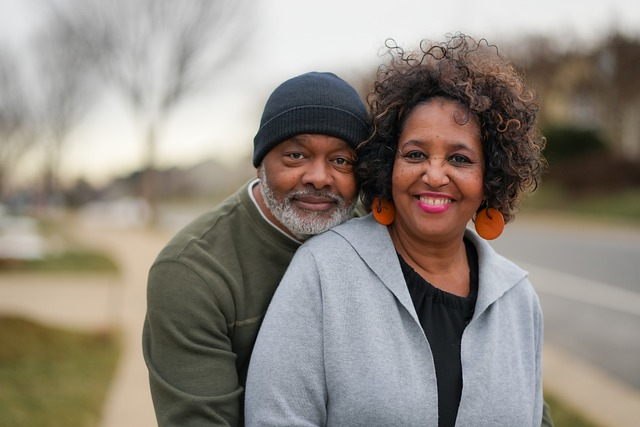
Bridging Hearts and Faiths: Cultivating Intimacy in Interfaith Marriages
How Can Interfaith Couples Maintain Intimacy Despite Religious Differences?
In the tapestry of an interfaith relationship, maintaining intimacy is akin to weaving together different colored threads to create a beautiful and harmonious pattern.
The key lies in embracing each other's religious or spiritual beliefs without judgment or an intent to change the other. It's about finding common ground in the essence of love, respect, and empathy.
For example, engaging in joint activities that are secular in nature or exploring the spiritual practices of each other’s religions can strengthen the bond.
Intimacy isn't just physical; it's deeply rooted in emotional and spiritual connection, a realm where different religious beliefs can coexist in harmony.
What Role Do Mutual Respect and Understanding Play in Interfaith Relationships?
Mutual respect is the cornerstone of any successful relationship, more so in interfaith marriages. Understanding and respecting each other's religious background and practices pave the way for a deeper, more meaningful connection.
It's about acknowledging and celebrating the diversity rather than perceiving it as a barrier. This approach transforms religious differences into opportunities for learning and growth, enhancing the intimacy of the relationship. Partners should strive to cheerfully celebrate religious holidays of both faiths, fostering a sense of inclusion and belonging.
How Can Religious Practices and Holidays be Harmonized in an Interfaith Marriage?
Harmonizing religious practices and holidays in an interfaith marriage is a delicate yet rewarding endeavor. It involves both partners being open to participating in each other's religious traditions while also finding ways to blend their customs in a respectful manner. This could mean creating new traditions that honor both faiths or alternating between celebrations. The focus should be on building a spiritual household that respects and cherishes the richness of both worlds.
For instance, an interfaith couple might decide to have a dual-celebration during religious holidays, ensuring that both feel valued and recognized.
In a world where love transcends borders, cultures, and, importantly, religions, the concept of intimacy in an interfaith marriage takes on a unique and profound significance.
Interfaith marriages, where partners come from different religious backgrounds, are a testament to the power of love and mutual respect. However, they also bring unique challenges, especially when it comes to maintaining intimacy and understanding.
The journey of interfaith couples is not just about merging lives but also about bridging the gaps between differing beliefs, practices, and traditions. As we delve into this sensitive and compelling topic, we also acknowledge the role of thoughtful gestures and intimate experiences, such as those offered by Every Love Intimates, in keeping the spark alive in such dynamic relationships.
How Can Interfaith Couples Maintain Intimacy Despite Religious Differences?
In the tapestry of an interfaith relationship, maintaining intimacy is akin to weaving together different colored threads to create a beautiful and harmonious pattern. The key lies in embracing each other's religious or spiritual beliefs without judgment or an intent to change the other. It's about finding common ground in the essence of love, respect, and empathy.
For example, engaging in joint activities that are secular in nature or exploring the spiritual practices of each other’s religions can strengthen the bond. Intimacy isn't just physical; it's deeply rooted in emotional and spiritual connection, a realm where different religious beliefs can coexist in harmony.
What Role Do Mutual Respect and Understanding Play in Interfaith Relationships?
Mutual respect is the cornerstone of any successful relationship, more so in interfaith marriages. Understanding and respecting each other's religious background and practices pave the way for a deeper, more meaningful connection.
It's about acknowledging and celebrating the diversity rather than perceiving it as a barrier. This approach transforms religious differences into opportunities for learning and growth, enhancing the intimacy of the relationship. Partners should strive to cheerfully celebrate religious holidays of both faiths, fostering a sense of inclusion and belonging.
How Can Religious Practices and Holidays be Harmonized in an Interfaith Marriage?
Harmonizing religious practices and holidays in an interfaith marriage is a delicate yet rewarding endeavor. It involves both partners being open to participating in each other's religious traditions while also finding ways to blend their customs in a respectful manner.
This could mean creating new traditions that honor both faiths or alternating between celebrations. The focus should be on building a spiritual household that respects and cherishes the richness of both worlds. For instance, an interfaith couple might decide to have a dual-celebration during religious holidays, ensuring that both feel valued and recognized.

Celebrating Diversity in Interfaith Marriages
The fabric of an interfaith marriage is woven with threads of diverse religious and cultural backgrounds, creating a tapestry rich in colors and patterns. This section highlights how the diversity inherent in different religious beliefs and backgrounds can be a source of joy and enrichment in interfaith marriages.
Harmonizing Different Religious Festivals
Celebrating different religious festivals in an interfaith relationship is not just about observing rituals; it's a profound way to honor and engage with each other's faiths.
For example, a couple comprising a Christian and a Jew might choose to cheerfully celebrate religious holidays like Christmas and Hanukkah, creating a unique blend of traditions.
These celebrations can become special moments that strengthen their bond, offering an opportunity to create new, shared memories while respecting their individual religious traditions.
Learning and Growing Together
Interfaith couples often find that their journey through different religious festivals and practices leads to a deeper understanding and respect for each other's beliefs. This process of learning and growing together can be a source of continual renewal for their relationship.
For instance, participating in each other's religious services or exploring the spiritual meanings behind various rituals can open new avenues for conversation, connection, and intimacy.

The Strength in Spiritual Diversity
The diversity in spiritual practices within interfaith marriages can be a formidable strength. It encourages partners to look beyond the surface-level differences and find common ground in shared values like love, compassion, and kindness. Embracing this diversity can lead to a more profound understanding not only of one's partner but also of one's own spiritual identity. This mutual respect and understanding lay a strong foundation for a successful interfaith marriage, where differences are not just tolerated but celebrated.
Challenges and Solutions in Interfaith Marriages
Interfaith marriages, while enriched with diversity, are not without their challenges. This section will explore some of these challenges and present practical solutions to ensure the health and longevity of these relationships.
Navigating Emotional Separation and Family Concerns
One of the more significant challenges in interfaith marriages is the potential for emotional separation due to differing beliefs and sometimes, the concerns of parental families. For instance, when partners have different religious backgrounds, they might feel isolated in their religious communities or face disapproval from families.
To counter this, it's crucial for partners to maintain open communication and offer each other unwavering support. Additionally, seeking professional support or proper counseling can help couples and their families navigate these complexities, ensuring a stronger bond and understanding within the relationship.
Respecting True Religious Identity
Another hurdle in interfaith relationships is ensuring that each partner can maintain their true religious identity while being part of a unified couple. This challenge calls for a delicate balance where both individuals can practice their faith without feeling the need to convert or dilute their beliefs. Embracing each other's religious association wholeheartedly, while also nurturing one's own faith identity, is key. Couples may find it beneficial to participate in educational resources or discussions with religious leaders to gain a deeper understanding of each other's faiths.
Maintaining Spiritual Practice in a Mixed Household
Creating a cohesive spiritual household in the midst of different religious practices can be challenging. Couples should strive to find a middle ground where both can practice their beliefs without infringing on the other's space. This might involve setting aside different times or areas in the home for individual spiritual practices, or finding joint activities that resonate with both partners' spiritualities. The goal is to ensure that both partners feel their spiritual needs are being met and respected.

Enhancing Intimacy with Every Love Intimates
In the unique dynamics of an interfaith marriage, finding ways to enhance intimacy and celebrate the couple's connection becomes essential. Every Love Intimates offers a range of products that can help interfaith couples deepen their bond beyond the realm of religious differences. This section will integrate the provided links, showcasing how these products can play a role in nurturing intimacy in interfaith relationships.
Exploring Intimacy Through Thoughtful Gestures
Every Love Intimates understands the importance of thoughtful gestures in nurturing a relationship. Products like the Date Night Box offer an excellent opportunity for interfaith couples to set aside religious or spiritual differences and focus on their shared love. These boxes can serve as a catalyst for meaningful conversations and shared experiences, fostering a deeper emotional and physical connection.
Celebrating Special Moments Together
Special occasions in an interfaith marriage can be amplified with the right attire and mood. Items like the Red Babydoll or the Black Lace Backless Bodysuit add an element of excitement and novelty to intimate celebrations, whether they are tied to religious festivals or personal milestones. These products not only enhance the physical aspect of intimacy but also add a sense of playfulness and exploration to the relationship.

Subscription Boxes for Regular Surprises
For ongoing enrichment of the intimate life, subscription boxes like the Get Naked Subscription Box offer a continuous stream of surprises and delights. This regular infusion of newness and anticipation can be especially valuable in interfaith marriages, where the routine of managing religious differences can sometimes overshadow the couple’s romantic life.
Lingerie as a Tool for Intimate Expression
Lingerie, such as the Pink 3-Piece Set or the Stormy Blue Open Side Lacy Nightdress, can be a powerful tool for self-expression and confidence-building in an intimate setting. For interfaith couples, these pieces can symbolize a shared space that is free from the complexities of differing beliefs, focusing instead on mutual attraction and desire.







